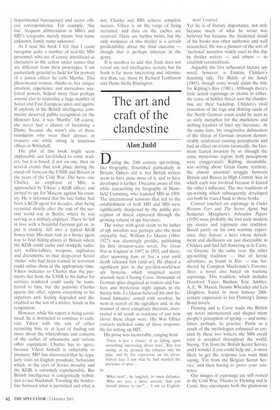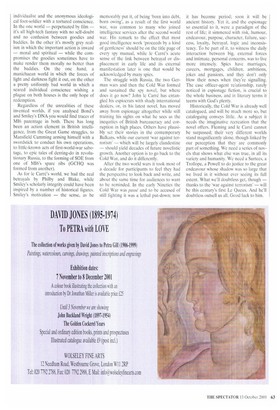The art and craft of the clandestine
Alan Judd
During the 20th century spy-writing, like biography, flourished particularly in Britain. Others did it, but British writers seem to have done more of it, and to have developed it farther. I became aware of this while researching my biography of Mansfield Cumming, who founded MI6 in 1909. The international tensions that led to the establishment of both MI5 and MI6 were significantly sharpened by the public perception of threat expressed through the growing volume of spy literature.
The writer with good claim to be father of spy novelists was perhaps also the most enjoyably bad. William Le Queux (18641927) was alarmingly prolific, publishing his first invasion-scare novel, The Great War in England in 1897, in 1893, and thereafter spawning four or five a year until death released him (and us). He played a significant part in the pre-first-world-war spy hysteria, which imagined secret arsenals near Charing Cross, thousands of German spies disguised as waiters and barbers and mysterious night signals in the Surrey hills. Le Queux believed his own fictional fantasies; armed with revolver, he went in search of the signallers and, in the manner of most conspiracy theorists, interpreted a nil result as evidence of just how clever these chaps were. His War Office contacts included some of those responsible for setting up MI5.
His prose was memorable, ranging from
'There is just a chance of us fatting upon something interesting about here'. Ray was saying, as he pressed the tobacco into his pipe, and by the expression on his cleanshaven face I saw that he had scented the presence of spies . ..
to
'What next!', he laughed, in open defiance. Who are you, a mere servant, that you should dictate to me'?'... 1 am an English man!' I replied.
Yet he is of literary importance, not only because much of what he wrote was believed but because the incidental detail of his books was often authentic and well researched. He was a pioneer of the sort of 'factional' narrative widely used to this day by thriller writers — and others — to establish verisimilitude.
Arguably the first influential literary spy novel, however, is Erskine Childers's haunting tale, The Riddle of the Sands (1903), though some would claim the title for Kipling's Kim (1901). Although there's little actual espionage or drama in either, the sense of hidden threat and the clandestine are their backdrop. Childers's vivid evocation of the fogs and shifting sands of the North German coast could be seen as an early metaphor for the murkiness and shifting loyalties of later spy literature. At the same time. his imaginative delineation of the threat of German invasion demonstrably reinforced existing perceptions and had an effect on events (ironically, the Germans feared invasion by us through the same mysterious region; both perceptions were exaggerated). Kipling, meanwhile, was writing about Great Game territory, the almost ancestral struggle between Britain and Russia in High Central Asia in which each was involved because it feared the other's influence. The two traditions of spy-writing which subsequently developed can both be traced back to those books.
Conrad touched on espionage in Under Western Eyes and The Secret Agent, but Somerset Maugham's Ashenden Papers (1928) were probably the first truly modern spy stories and represent one tradition, Based partly on his own wartime experience, they feature a hero whose detachment and disillusion are just discernible in Childers and find full flowering in le Carre, via Greene. In the same year, the other spy-writing tradition — that of heroic adventure, as found in Kim — was furthered by Compton Mackenzie's Extremes Meet, a novel also based on wartime espionage. This tradition, which includes Dornford Yates, Buchan, Eric Ambler, A. E. W. Mason, Dennis Wheatley and Len Deighton, found its most famous 20thcentury expression in Ian Flerning's James Bond novels.
Fleming and le Carre made the British spy novel international and shaped many people's perception of spying — and sometimes, perhaps, its practice. Partly as a result of the mythologies enhanced or created by these two writers, the MI6 credit card is accepted throughout the world, Saying, 'I'm from the British Secret Service and I wonder if you could help me', is more likely to get the response you want than saying, 'I'm from the Belgian Secret Service' and then having to prove your existence.
Our images of espionage are still rooted in the Cold War. Thanks to Fleming and le Carre", they encompass both the glamorous individualist and the anonymous ideological foot-soldier with a tortured conscience. In the one world — perpetuated by film — it's all high-tech fantasy with no self-doubt and no confusion between goodies and baddies. In the other it's mostly grey realism in which the important action is inward — moral and spiritual — while the compromises the goodies sometimes have to make render them morally no better than the baddies. On the one hand, a manichaean world in which the forces of light and darkness fight it out, on the other a pretty uniformly bad world in which a seared individual conscience wishing a plague on both houses is the only hope of redemption.
Regardless of the unrealities of these invented worlds, if you analysed Bond's and Smiley's DNA you would find traces of MI6 parentage in both. There has long been an action element in British intelligence, from the Great Game struggles. to Mansfield Cumming arming himself with a swordstick to conduct his own operations, to little-known acts of first-world-war sabotage, to epic tales of derring-do in revolutionary Russia, to the forming of SUE from one of MI6's spare ribs (GCHQ was formed from another).
As for le Carres world, we had the real betrayals by Philby and Blake, while Smiley's scholarly integrity could have been inspired by a number of historical figures. Smiley's motivation — the sense, as he memorably put it, of being 'born into debt, born owing', as a result of the first world war, was common to many who joined intelligence services after the second world war. His remark to the effect that most good intelligence work 'proceeds by a kind of gentleness' should be on the title page of every spy manual, while le Cane's acute sense of the link between betrayal or displacement in early life and its external manifestation later is one that would be acknowledged by many spies.
The struggle with Russia, the two German wars and then the Cold War formed and sustained the spy novel, but where does it go now? John le Carre has entangled his espiocrats with shady international dealers, or, in his latest novel, has moved away from espionage altogether while still training his sights on what he sees as the inequities of British bureaucracy and corruption in high places. Others have plausibly set their stories in the contemporary Balkans, while our current 'war against terrorism' — which will be largely clandestine — should yield decades of future novelistic growth. Another option is to go back to the Cold War, and do it differently.
After the two world wars it took most of a decade for participants to feel they had the perspective to look back and write, and about the same time for audiences to want to be reminded. In the early Nineties the Cold War was passe and to be accused of still fighting it was a lethal put-down; now
it has become period; soon it will be ancient history. Yet it, and the espionage so essential to it, were a paradigm of the rest of life; it simmered with risk, humour, endeavour, purpose, character, failure, success, loyalty, betrayal, logic and inconsistency. To be part of it, to witness the daily interaction between big, external forces and intimate, personal concerns, was to live more intensely. Spies have marriages, careers, mortgages, children, ambitions, jokes and passions, and they don't only blow their noses when they're signalling. The case officer-agent relationship, rarely noticed in espionage fiction, is crucial to the whole business, and in literary terms it teems with God's plenty.
Historically, the Cold War is already well catalogued, and will be much more so, but cataloguing conveys little. As a subject it needs the imaginative recreation that the novel offers, Fleming and le Cane cannot be surpassed; their very different worlds stand magnificently alone, though linked by our perception that they are commonly part of something. We need a series of novels that shows what else was true, in all its variety and humanity. We need a Surtees, a Trollope, a Powell to do justice to the great endeavour whose shadow was so large that we lived in it without ever seeing its full extent. What we'll doubtless get, though — thanks to the 'war against terrorism' — will be this century's first Le Queux. And he'll doubtless outsell us all. Good luck to him.



























































































 Previous page
Previous page